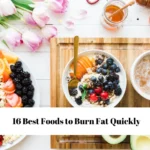Are you looking to boost your protein intake while sticking to a plant-based diet? You’re in the right place! Whether you’re a vegetarian, vegan, or simply trying to reduce your meat consumption, finding the best plant-based protein sources is essential for maintaining a healthy, balanced diet. Fortunately, there are a variety of nutrient-packed plant-based proteins that can meet your daily needs and fuel your body.
From legumes like lentils and chickpeas to nutrient-rich seeds and algae, these protein sources not only offer high protein content but are also packed with essential vitamins, minerals, and healthy fats. Plant-based proteins provide sustainable, heart-healthy options while supporting muscle growth, energy levels, and overall wellness. In this blog, we’ll explore the 15 best plant-based protein sources you can easily incorporate into your meals for a well-rounded and delicious diet.
1. Lentils
Lentils are a versatile legume, rich in protein and fiber. One cup of cooked lentils contains around 18 grams of protein. Lentils are also an excellent source of iron, folate, and potassium, making them a well-rounded food for both vegetarians and meat-eaters.
They come in various forms such as green, red, and black lentils, and can be used in soups, salads, or curries. Their high fiber content supports digestive health, and their low glycemic index helps in maintaining stable blood sugar levels.
2. Chickpeas
Chickpeas, also known as garbanzo beans, are another legume packed with protein. A single cup of cooked chickpeas offers about 15 grams of protein. They are high in fiber, which helps promote digestive health and aids in weight management by keeping you fuller for longer.
Chickpeas are also rich in essential nutrients such as iron, magnesium, and zinc. They can be enjoyed in a variety of dishes, from hummus and stews to salads and falafel, making them a versatile and tasty plant-based protein option.
3. Quinoa
Quinoa is a unique grain that is considered a complete protein, meaning it contains all nine essential amino acids. One cup of cooked quinoa provides approximately 8 grams of protein. In addition to being a protein powerhouse, quinoa is a good source of magnesium, iron, fiber, and manganese.
It’s gluten-free, making it a great option for those with gluten sensitivity or celiac disease. Quinoa can be used in salads, as a side dish, or as a base for a plant-based bowl, offering both nutrition and versatility.
4. Tofu
Tofu, made from soybeans, is a staple in many plant-based diets. It is a complete protein, offering about 10 grams of protein per 100 grams. Tofu is also a great source of calcium, iron, and magnesium, making it beneficial for bone health and muscle function.
Its neutral flavor allows it to absorb the flavors of any seasoning or sauce, making it highly adaptable in stir-fries, soups, and even smoothies. Additionally, tofu comes in different textures silken, firm, and extra firm suiting various culinary applications.
5. Tempeh
Tempeh, like tofu, is made from soybeans but is less processed, retaining more of the bean’s natural nutrients. One cup of tempeh contains about 31 grams of protein, making it one of the richest plant-based protein sources. It also provides probiotics, which support gut health, thanks to the fermentation process.
Tempeh has a firmer texture and a nutty flavor, which works well in sandwiches, stir-fries, and salads. Its dense nutrient profile, including fiber, magnesium, and B vitamins, makes it a highly nutritious protein choice.
6. Edamame
Edamame, or young soybeans, are another excellent source of plant-based protein. A cup of cooked edamame provides about 18 grams of protein. These beans are rich in healthy fats, fiber, and a range of vitamins and minerals, including folate, iron, and magnesium.
Edamame can be enjoyed as a snack, added to salads, or used in stir-fries. They are also high in antioxidants, which can help reduce inflammation and support heart health. Their fresh, green taste makes them a favorite in many cuisines.
7. Chia Seeds
Chia seeds, while small in size, pack a powerful protein punch. Two tablespoons of chia seeds contain around 4 grams of protein and 11 grams of fiber. They are also an excellent source of omega-3 fatty acids, which are essential for heart and brain health.
Chia seeds can absorb up to 10 times their weight in water, forming a gel-like consistency that makes them ideal for use in puddings, smoothies, and baking. They are also rich in calcium, magnesium, and antioxidants, making them a superfood in the plant-based protein world.
8. Hemp Seeds
Hemp seeds are another nutrient-dense seed, offering about 10 grams of protein per 3 tablespoons. They are a complete protein and are also rich in omega-3 and omega-6 fatty acids, which support heart health and reduce inflammation.
Hemp seeds have a mild, nutty flavor and can be sprinkled on salads, yogurt, or added to smoothies. They are also a good source of magnesium, iron, and zinc, making them an excellent addition to any diet. Hemp seeds are easy to digest and provide both essential amino acids and healthy fats.
9. Peas
Green peas are not only a great source of fiber but also provide a good amount of protein—around 8 grams per cup. Peas are also rich in vitamins A, K, and C, as well as a variety of antioxidants. Pea protein is commonly used in plant-based protein powders due to its high protein content and digestibility.
In addition to being used in soups, stews, and stir-fries, peas can be mashed into spreads or dips. Their high fiber content promotes satiety and supports digestive health, making them a valuable addition to a plant-based diet.
10. Black Beans
Black beans are another legume that offers a significant amount of protein, with about 15 grams per cooked cup. They are also rich in fiber, which promotes digestive health, and are an excellent source of iron, magnesium, and folate.
Black beans can be used in a variety of dishes, including soups, burritos, salads, and veggie burgers. Their high nutrient content and ability to pair well with grains make them a valuable protein source for those on plant-based diets. Additionally, the antioxidants in black beans contribute to heart health.
11. Almonds
Almonds are one of the highest-protein nuts, providing around 6 grams of protein per ounce (about 23 almonds). They are also high in healthy fats, particularly monounsaturated fats, which are good for heart health. Almonds are a rich source of vitamin E, magnesium, and fiber.
They can be eaten on their own, added to smoothies, or used in baking. Almond butter is another excellent way to incorporate almonds into your diet. Their crunchy texture and slightly sweet flavor make them a favorite snack among plant-based eaters.
12. Sunflower Seeds
Sunflower seeds are another nutritious seed that provides about 6 grams of protein per 1-ounce serving. They are also rich in healthy fats, vitamin E, and magnesium, which support heart health and reduce inflammation.
Sunflower seeds can be added to salads, yogurt, or baked goods, or enjoyed as a snack. They are also an excellent source of selenium, an antioxidant that helps protect cells from damage. Sunflower seed butter is a popular alternative to peanut butter, providing a creamy texture and a slightly nutty flavor.
13. Seitan
Seitan is made from gluten, the main protein in wheat, and is one of the most protein-dense plant-based foods available. A 3-ounce serving of seitan provides around 21 grams of protein. Its chewy texture and savory flavor make it an excellent meat substitute in various dishes, including stir-fries, sandwiches, and stews.
However, since it is made from wheat gluten, seitan is not suitable for those with celiac disease or gluten sensitivity. Seitan is rich in iron and calcium, making it a valuable source of nutrients in plant-based diets.
14. Pumpkin Seeds
Pumpkin seeds, also known as pepitas, are small but mighty when it comes to protein content. One ounce (about 85 seeds) contains around 7 grams of protein. They are also packed with antioxidants, healthy fats, magnesium, and zinc.
Pumpkin seeds can be enjoyed as a snack, added to oatmeal, or used in baking. Their nutrient profile supports heart health, immune function, and muscle recovery. Pumpkin seed butter is another way to enjoy their benefits, offering a creamy, nutty spread packed with nutrients.
15. Spirulina
Spirulina is a blue-green algae that is one of the most nutrient-dense foods on the planet. Just 2 tablespoons of spirulina powder contain about 8 grams of complete protein. It is also rich in vitamins B1, B2, and B3, copper, and iron.
Spirulina’s antioxidant and anti-inflammatory properties make it a powerful superfood. It can be added to smoothies, juices, or taken as a supplement. Its high protein content, along with its wealth of vitamins and minerals, makes spirulina an excellent addition to any plant-based diet, particularly for athletes or those needing a nutrient boost.
Conclusion
Incorporating these 15 best plant-based protein sources into your diet ensures that you’re getting the essential nutrients your body needs, all while supporting a sustainable and heart-healthy lifestyle. Whether you’re adding lentils to soups, tossing hemp seeds into salads, or enjoying a quinoa-based bowl, these plant-based proteins offer versatility, nutrition, and flavor.
From building muscle to boosting energy, plant-based protein sources help you meet your dietary goals without compromising on health or taste. So, make the switch today and enjoy the benefits of these powerful, plant-based proteins!
FAQs:
1. What are the best plant-based protein sources for building muscle?
Lentils, tofu, tempeh, and quinoa are excellent plant-based protein sources for building muscle, as they provide high-quality protein and essential amino acids.
2. Can plant-based proteins provide all essential amino acids?
Yes, some plant-based proteins like quinoa, soy (tofu and tempeh), and hemp seeds are complete proteins, meaning they provide all nine essential amino acids.




